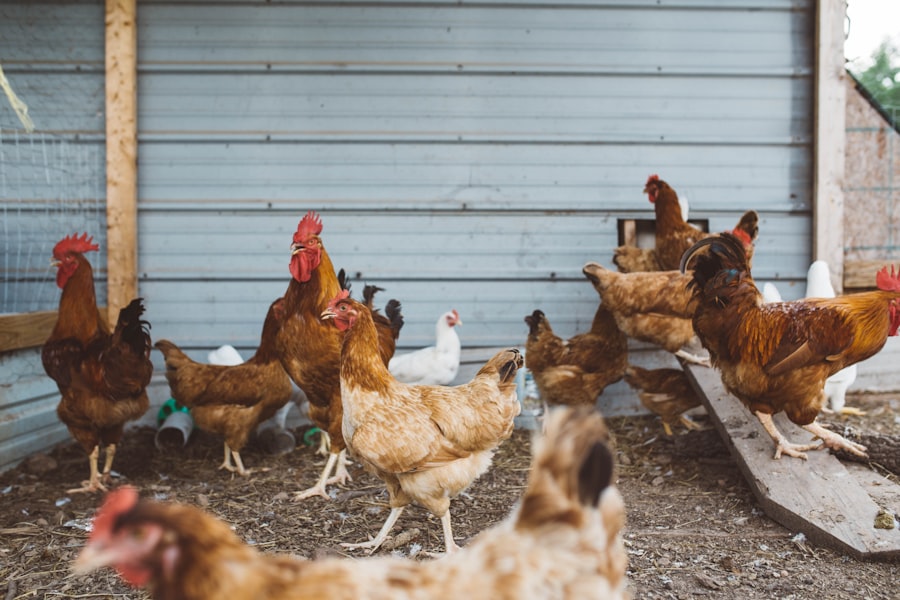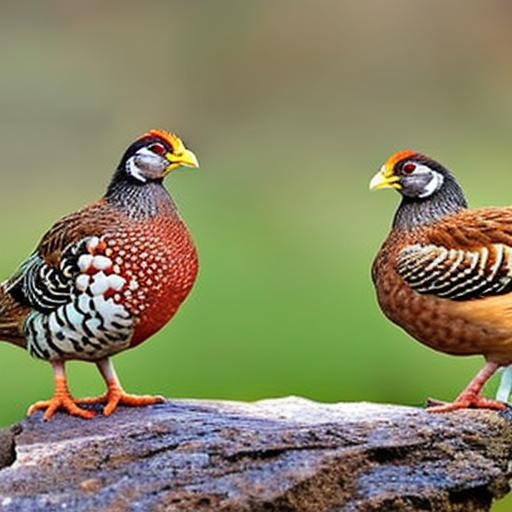Keeping quails with chickens can be a rewarding and beneficial practice for poultry enthusiasts. Quails and chickens have different needs and behaviors, but with proper planning and management, they can coexist harmoniously in the same environment. Quails are smaller in size and have unique characteristics that make them an interesting addition to a chicken flock. They are known for their high egg production, small size, and ability to thrive in smaller spaces. Chickens, on the other hand, are larger and more social birds that are popular for their meat and egg production. When kept together, quails and chickens can complement each other, providing a diverse range of products for the poultry keeper. In this article, we will explore the various aspects of keeping quails with chickens, including housing and coop requirements, feeding and nutrition, health and disease management, integrating quails with chickens in the flock, behavioral considerations, and the benefits of this practice.
Key Takeaways
- Keeping quails with chickens can be beneficial for both birds and the farmer, as they can help control pests and provide a diverse range of eggs and meat.
- Quails and chickens can be housed together, but it’s important to provide separate areas for nesting and roosting to prevent aggression and competition.
- Both quails and chickens require a balanced diet of commercial feed, supplemented with greens, grains, and protein sources like mealworms.
- Regular health checks and biosecurity measures are essential to prevent the spread of diseases between quails and chickens.
- When integrating quails with chickens, it’s important to introduce them gradually and monitor their interactions to ensure a harmonious flock dynamic.
Housing and Coop Requirements for Quails and Chickens
When keeping quails with chickens, it is important to provide suitable housing and coop requirements for both species. Quails require a different type of housing compared to chickens due to their smaller size and unique needs. Quails are ground-dwelling birds that prefer to have access to a secure and sheltered area where they can lay their eggs and roost at night. Their housing should be designed to prevent predators from accessing the birds, as quails are more vulnerable to attacks due to their smaller size. Additionally, quails need access to nesting boxes filled with suitable bedding material to lay their eggs. On the other hand, chickens require a larger coop with roosting bars, nesting boxes, and adequate space for them to move around and exhibit natural behaviors. The coop should also have good ventilation and protection from extreme weather conditions to ensure the health and well-being of the birds. When integrating quails with chickens, it is important to provide separate areas within the coop for each species to prevent aggression and competition for resources. By providing suitable housing and coop requirements for both quails and chickens, poultry keepers can create a harmonious environment for their birds to thrive.
Feeding and Nutrition for Quails and Chickens
Feeding and nutrition are essential aspects of keeping quails with chickens, as both species have different dietary requirements. Quails are omnivorous birds that require a high-protein diet to support their rapid growth and egg production. They can be fed a commercial game bird feed or a mixture of grains, seeds, and insects to meet their nutritional needs. Additionally, quails need access to grit to aid in the digestion of their food, as well as calcium supplements to support eggshell formation. Chickens, on the other hand, require a balanced diet that includes a combination of grains, protein sources, fruits, vegetables, and calcium supplements. They can be fed a commercial layer feed or a mixture of grains and kitchen scraps to ensure they receive the necessary nutrients for egg production and overall health. When keeping quails with chickens, it is important to provide separate feeding areas for each species to prevent competition and ensure that all birds have access to their required food. Additionally, providing access to fresh water at all times is essential for both quails and chickens to maintain hydration and overall health. By understanding the specific feeding and nutritional needs of quails and chickens, poultry keepers can ensure that their birds receive the appropriate diet to support their growth, egg production, and overall well-being.
Health and Disease Management for Quails and Chickens
Maintaining the health and managing diseases in quails and chickens is crucial for successful poultry keeping. Both species are susceptible to various health issues and diseases that can impact their well-being and productivity. It is important for poultry keepers to implement biosecurity measures to prevent the introduction and spread of diseases within the flock. This includes regular cleaning and disinfection of the coop, quarantine procedures for new birds, and limiting exposure to wild birds and other potential sources of infection. Additionally, providing a suitable environment with good ventilation, clean water, and proper nutrition can help support the immune system of quails and chickens, reducing their susceptibility to diseases. It is also important to monitor the birds regularly for any signs of illness or distress, such as changes in behavior, decreased egg production, or abnormal physical symptoms. When keeping quails with chickens, it is essential to be aware of the specific health issues that each species may face and seek veterinary advice if any concerns arise. By implementing proactive health management practices and seeking professional guidance when needed, poultry keepers can help ensure the well-being of their quails and chickens.
Integrating Quails with Chickens in the Flock
Integrating quails with chickens in the flock requires careful planning and management to ensure a smooth transition for both species. Quails are generally more timid and less aggressive compared to chickens, so it is important to introduce them gradually to the existing flock to minimize stress and potential conflicts. Providing separate areas within the coop for quails to roost and lay eggs can help reduce competition with chickens and allow them to establish their own space within the flock. Additionally, introducing new birds during the evening when they are more likely to roost can help minimize aggression from existing flock members. It is also important to monitor the interactions between quails and chickens during the integration process and intervene if any aggressive behavior occurs. By providing a gradual introduction and monitoring the interactions between quails and chickens, poultry keepers can help facilitate a successful integration within the flock.
Behavioral Considerations for Quails and Chickens

Understanding the behavioral differences between quails and chickens is important when keeping them together in the same environment. Quails are ground-dwelling birds that prefer to forage for insects and seeds on the ground, as well as dust bathe to maintain their plumage. They are generally more timid and prefer to roost at ground level compared to chickens. Chickens, on the other hand, are more social birds that exhibit a hierarchical structure within the flock. They are known for scratching the ground, dust bathing, and perching on elevated roosting bars within the coop. When keeping quails with chickens, it is important to provide suitable environmental enrichment that caters to the natural behaviors of both species. This includes providing access to suitable foraging areas, dust bathing spots, roosting bars at different heights, and nesting boxes filled with appropriate bedding material. By understanding the behavioral considerations of quails and chickens, poultry keepers can create an environment that supports natural behaviors and reduces stress within the flock.
Benefits of Keeping Quails with Chickens
There are several benefits to keeping quails with chickens in the same environment. Quails are known for their high egg production, with some species laying up to 300 eggs per year. By keeping quails with chickens, poultry keepers can diversify their egg production and have access to smaller eggs that are popular in gourmet cooking. Additionally, quail eggs are known for their nutritional value, being higher in protein and lower in cholesterol compared to chicken eggs. Quail meat is also considered a delicacy in many cultures, providing an additional source of protein for poultry keepers. Furthermore, quails are known for their ability to thrive in smaller spaces compared to chickens, making them suitable for urban or backyard settings where space may be limited. By keeping quails with chickens, poultry enthusiasts can maximize the productivity of their flock while enjoying a diverse range of products from both species.
In conclusion, keeping quails with chickens can be a rewarding practice that provides a diverse range of products for poultry enthusiasts. By understanding the specific housing and coop requirements, feeding and nutritional needs, health management practices, integration within the flock, behavioral considerations, and benefits of this practice, poultry keepers can create a harmonious environment where quails and chickens can thrive together. With proper planning and management, quails and chickens can coexist in the same environment, providing eggs, meat, and companionship for poultry enthusiasts.
If you’re considering keeping quails with chickens, it’s important to ensure that your coop is equipped to meet the needs of both species. One crucial aspect to consider is the temperature inside the coop. In a related article on PoultryWizard, you can learn about the importance of having a heater for a chicken coop to ensure that your birds stay warm and comfortable during colder months. This article provides valuable insights into selecting the right heater for your coop, which is essential for creating a suitable environment for both quails and chickens. Learn more about heaters for chicken coops here.
FAQs
What are the benefits of keeping quails with chickens?
Keeping quails with chickens can provide several benefits, including pest control, increased egg production, and a more diverse and interesting flock.
What should I consider before keeping quails with chickens?
Before keeping quails with chickens, it’s important to consider the space requirements, compatibility of the two species, and potential health risks. Additionally, it’s important to check local regulations and zoning laws regarding keeping quails.
How can I introduce quails to my existing chicken flock?
When introducing quails to an existing chicken flock, it’s important to do so gradually and carefully. Providing separate but adjacent living spaces for the two species can help them get used to each other’s presence before allowing them to interact directly.
What are the housing requirements for keeping quails with chickens?
Quails and chickens have different housing requirements, so it’s important to provide separate areas for each species within the same coop or run. Quails require lower perches and smaller nesting boxes compared to chickens.
Are there any health concerns when keeping quails with chickens?
There are potential health concerns when keeping quails with chickens, including the risk of disease transmission between the two species. It’s important to monitor the health of both quails and chickens regularly and consult with a veterinarian if any issues arise.
What should I feed quails and chickens when keeping them together?
Quails and chickens have different dietary needs, so it’s important to provide separate feeders for each species. Quails require a higher protein diet compared to chickens, so it’s important to provide them with appropriate feed.
Meet Walter, the feathered-friend fanatic of Florida! Nestled in the sunshine state, Walter struts through life with his feathered companions, clucking his way to happiness. With a coop that’s fancier than a five-star hotel, he’s the Don Juan of the chicken world. When he’s not teaching his hens to do the cha-cha, you’ll find him in a heated debate with his prized rooster, Sir Clucks-a-Lot. Walter’s poultry passion is no yolk; he’s the sunny-side-up guy you never knew you needed in your flock of friends!







